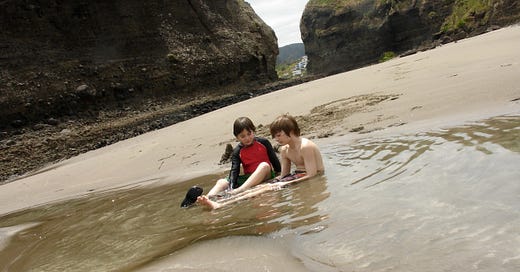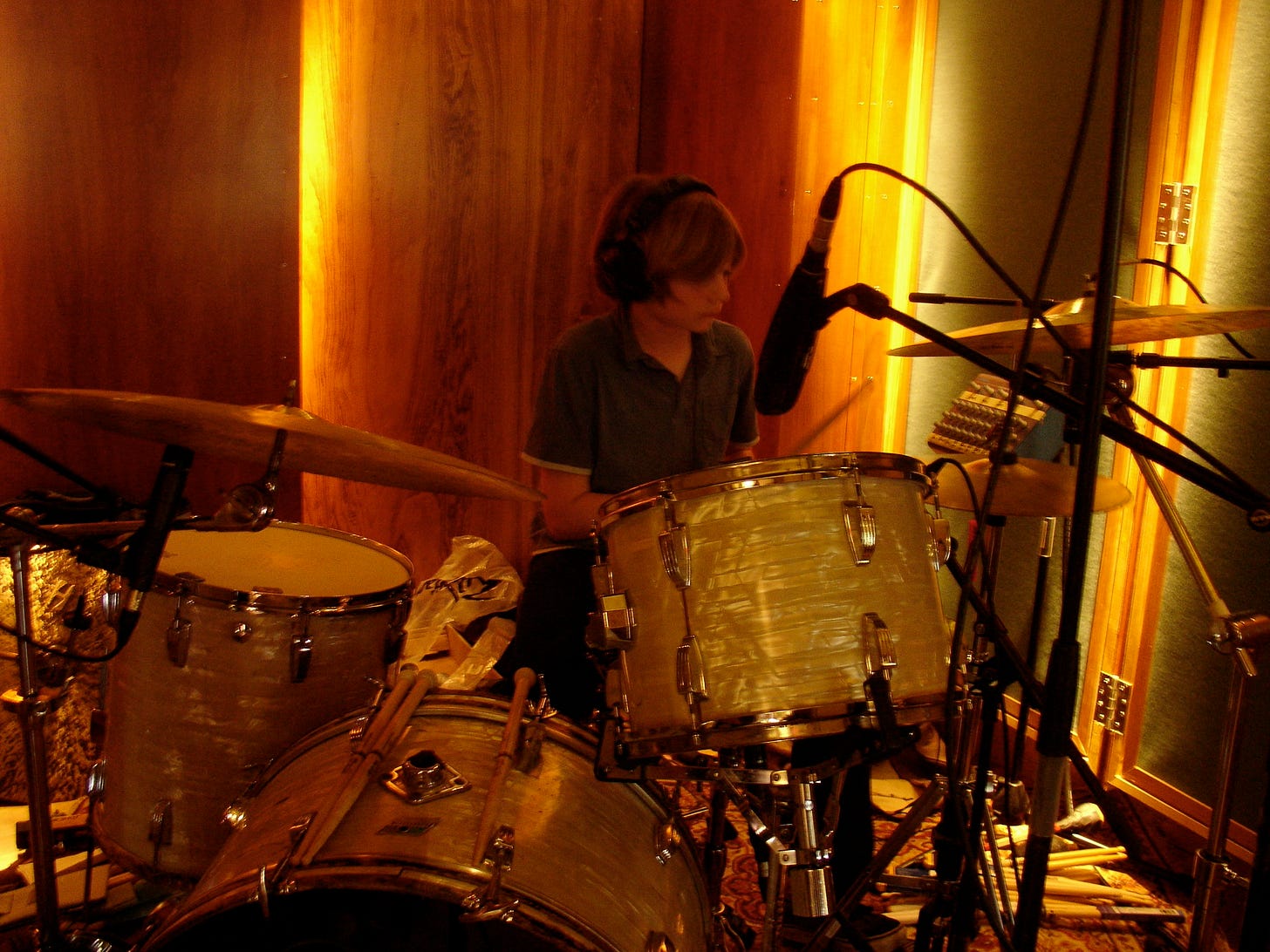I’ve been home. I’ve been doing part-time work and observing/assisting at the studio. And adjusting to pre-summer, which is always a slightly weird-feeling time to me, for reasons I only partly understand. Summer weather is out-of-school weather, which brings up a childhood nostalgia and anxiety I don’t particularly like. Last year, the season also became associated with the first real social pain of my adult life, so that crept up in my mind again. As a cherry on top, I knocked myself off my sleep routine rocker (that’s a euphemism, I don’t actually sleep in a gently lilting bassinet). But I’m OK, truly—just giving you the facts about my life, since that’s ostensibly what I’m (un)paid to do :)
Last week, Sammy, our friend Gus, and I went to see Crowded House at the Chicago Theatre. We loved the show—were blown away by Neil’s voice, the songs, and the camaraderie in the band—even if we were caught in the classic battle between Standing Patrons and Sitting Patrons. It didn’t help matters that Gus is way over six feet tall. Sorry, Gus, it’s not your fault. I’m sure the people standing behind us knew you didn’t purposely sprout eight inches of growth plate in your shins before the show just for the sake of spiting them. I hope.
We Tweedys love the Finns—Neil, Sharon, Liam, and Elroy—because they’re great and because we got to spend two weeks in New Zealand with them in 2008. That winter (summer for them), Neil reconvened his 7 Worlds Collide project to record a fundraiser album, The Sun Came Out, for Oxfam. My dad, John Stirratt, Glenn Kotche, and Pat Sansone were invited to be part of it and, incredibly, were invited to bring their families along with them. When not at Neil’s Roundhead Studios, we spent the majority of the time there on the beach, eating “fush ‘n’ chups,” trying not to get clobbered by the waves. I got to sit in on a track by Lisa Germano, called “Reptile.”1
The Finns were so kind to us, not only in letting families travel and stay during the session but also in every way they treated us while we were there. Just straight-up kind, funny people. So every time they tour the US or we run into Liam in LA or, more rarely, when we get to play in New Zealand again, it feels like visiting family.
Here’s a little freako thought that blossomed into several paragraphs I want to include this week.
Town Morale
Do you ever imagine that a bunch of people experiencing a similar thing at the same time creates some sort of psychic pulse that could be felt over distances?2 Or, if you’re not the telepathy type, that there’s a general mood to a group, a city, a country, and that that mood affects the world materially as everyone goes about their lives, making decisions in and of the mood?
I believe in some version of those ideas and feel like, this month, Chicago is undergoing a collective psychological event called Traffic.
The inbound Kennedy highway is half-closed until the fall. Then, next year, the outbound Kennedy will be closed until the fall. The following summer, the middle express lanes will be closed. It’s not a big deal in the grand scheme of life, of course. Being late, needing more time to commute, sitting on a slab of pavement once in a while (or even every day) are ultimately just inconveniences. Still, inconveniences can darken your world-viewing glasses, make people less charitable, add fuel to a temper that rears itself in other places. What happens when that shrouding takes place “at scale”?
Beyond inconveniences (which may or may not be worthwhile), into the realm of actual injustices, DEBT is just one that comes to mind. Three out of four people are walking around the community with a plaguey rat gnawing in their head, eroding patience, making it harder to be nice to yourself and others. Analyzing why debt is so widespread and what we can do about it is more than I know how to bite off right now. At a minimum, it seems uncontroversial to say: Wouldn’t it rule if that weight were lifted? For yourself, for everyone?
When it comes to art, I’ve learned over time not to worry as much about “town morale.” As a kid, I thought every fan and critic’s opinion was infinitely important and that you never know when one of their feelings could Butterfly Effect out into an overall perception about your art. In a way, I guess that’s true, since some people are influential and can set a tone for thousands of others when they say what they think. But that’s not the case for the majority of people. Their thoughts and feelings about the work matter deeply, just not in a way that should cause anxiety all the time about the consequences for your art.
As some of you might imagine, these thoughts became prominent in my mind around 2006-2009 when the “dad band” narrative about Wilco was emerging. When, for the first time I could see, some people were writing off the quality of the band’s music.
Now I realize that just about all of that is outside of your control. Artists can and should make good management decisions, and they can put care into press. But on the whole, you can’t dictate what other people think. Doy! Maybe there are Ray Cohns out there who can wrap music press around their finger and manipulate listeners into thinking anything about a band. But in general, the world is a big place, culture is amorphous, and it’s a fool’s errand to think you can move the whole mountain of public perception just by your sheer will (and a couple of feature articles). You can do something, and you can build real, positive relationships with listeners over time. But you can’t really force the river to go where you want it to go. (We’re talking combination mountain-rivers here, people.)
The other thing I’ve realized is that the situation is better than I thought. Yes, some things make some people mad, and some people drop off the bandwagon when an artist’s coolness ebbs and flows. But on the whole, the “every little thing” I used to worry about is just that: little things. Individual fans’ disappointments, as unsettling as they are to witness, aren’t the whole world. People will come and people will go, and it doesn’t mean everyone will go with them.
It’s strange to have learned that lesson before large-scale collective punishments and ostracism had become commonplace. The lesson still applies, though. Not because people have taken the teeth out of ostracism via some backlash to “cancel culture” over the last several years, but because most things still don’t lead to a response like that in the first place if they don’t deserve one. Most.
All this just to say that traffic sucks?! I’m curious about the intuitive state of communities. The emotional is material because it’s influenced by “real stuff” and in turn causes us to influence “real stuff.” And even when it doesn’t cash out into something tangible, well, we care about how people feel, don’t we? So it all matters. Hopefully, in fall 2025, when the LED lights on the highway are installed, the express lanes have fancier reversible gates, and the cracks and potholes are filled, we’ll look back on our dampened moods and boosted tempers and feel like they were worth it.
The hiccup you hear in the drums at one point was not on purpose. It was a mistake and Lisa loved it, so it stayed. Sometimes, especially when you’re 13, the simplest beats are the ones that trip you up…
An old, mystical idea that’s been absorbed by Star Wars.








We’ll said Spencer. You are wise well above your years. See ya in a couple weeks!
Lucky kids! Hey Spencer sometime would you show how you mic your drums in studio and live and type of mic? Gear Talk?